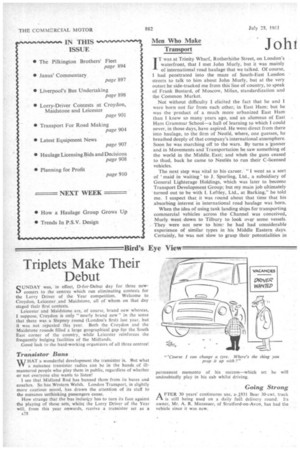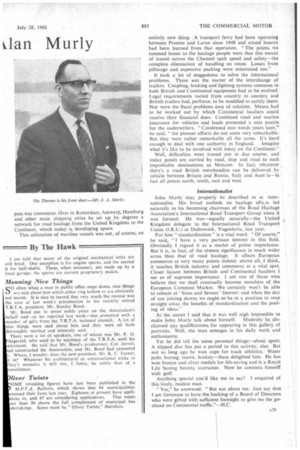Men Who Make Transport
Page 30

Page 31

If you've noticed an error in this article please click here to report it so we can fix it.
Johi
an Murly IT was at Trinity Wharf, Rotherhithe Street, on London's waterfront, that I met John Murly, but it was mainly of international road haulage that we talked. Of course, I had penetrated into the maze of South-East London streets to talk to him about John Murly, but at the very outset he side-tracked me from this line of country, to speak of Frank Bustard, of Moscow, Milan, standardization and the Common Market.
Not without difficulty I elicited the fact that he and I were born not far from each other, in East Ham: but he was the product of a much more urbanized East Ham than I knew so many years ago, and an alumnus of East Ham Grammar School—a hall of learning to which I could never, in those days, have aspired. He went direct from there into haulage, to the firm of Nestle, where, one guesses, he breathed deeply of that company's international atmosphere. Soon he was marching off to the wars. By turns a "gunner and in Movements and Transportation he saw something of the world in the Middle. East; and when the guns ceased to thud, back he came to Nestles to run their C-licensed vehicles.
The next step was vital to his career. " I went as a sort of 'maid in waiting' to J. Spurling, Ltd., a subsidiary of General Lighterage Holdings, which was later to become Transport Development Group; but my main job ultimately turned out to be with I. Leftley, Ltd., at Barking," he told me. I suspect that it was round about that time that his absorbing interest in international road haulage was born.
When the idea of using tank landing ships for transporting commercial vehicles across the Channel was conceived, Murly went down to Tilbury to look over some vessels. They were not new to him 7 he had had considerable experience of similar types in his Middle Eastern days. Certainly, he was not slow to grasp their potentialities in
post war commerce. Over in Rotterdam, Antwerp, Hamburg and other main shipping cities he set up by degrees a network for road haulage from the United Kingdom to the Continent, which today is. developing apace.
This utilization of wartime vessels was not, of course, an entirely new thing. A transport ferry had been operating between Preston and Larne since 1948 and sound lessons had been learned from that operation. "The points we rammed home to the haulage people were that this means of transit across the Channel spelt speed and safety—the complete elimination of handling en route. Losses from pilferage and expensive packing were minimized too."
It took a lot of doggedness to solve the international problems. There was the matter of the interchange of trailers. Coupling, braking and lighting systems common to both British and Continental equipment had to be evolved. Legal requirements varied from country to country and British trailers had, perforce, to be modified to satisfy them. Nor were the fiscal problems easy of solution. Means had to be worked out by which Continental hauliers could receive their financial dues. Combined road and marine insurance for vehicles and loads presented a nice puzzle for the underwriters. "Condensed into words years later," he said, "the pioneer efforts do not seem very remarkable. But they were rather remarkable all the same. It's hard enough to deal with one authority in England. Imagine what it's like to be involved with many on the Continent."
Well, difficulties were ironed out in due course, and today goods are carried by road, ship and road to such improbable destinations as Moscow. In fact, •wherever _ there's a road British merchandize can be deliver:d by vehicle between Britain and Russia, Italy and Aust.i ia—in fact all points north, south, east and west.
Internationalist John Murly may properly be described as at internationalist. His broad outlook on haulage affa..rs led naturally to his becoming chairman of the Road Haulage Association's International Road Transport Group when it was formed. He was—equally naturally—the United Kingdom delegate to the International Road Transport Union (I.R.U.) at Dubrovnik, Yugoslavia, last year.
For him " standardization " is a vital word. "Of course," he said " I have a very partisan interest in this field. Obviously I regard it as a matter of prime importance. But it is, in fact, of the utmost significance in much wider areas than that of road haulage. It affects European commerce at very many points indeed: above all, I think, it touches British industry and commerce at a vital spot. Closer liaison between British and Continental hauliers I see as of supreme importance. I am one of those who believe that we shall eventually become members of the European Common Market. We certainly won't be able to remain at 'Sixes and Sevens' forever: and when the day of our joining dawns we ought to be in a position to reap straight away the benefits of standardization and the pool
ing of ideas." .
At-the outset I said that it was well nigh impossible to make John Murly talk about himself. Modestly he disclaimed any qualifications for appearing in this gallery of portraits. Well, the man emerges in his daily work and enthusiasms.
Yet he did tell Me some personal things—about sport. A slipped disc has put a period to this activity, alas. But not so long ago he won cups for track athletics. Water polo, boxing, tennis, hockey—these delighted him. He has won bronze and silver medals for life-saving and is a Royal Life Saving Society instructor. Now he contents himself with golf.
Anything special you'd like me. to say? I enquired of this lively, modest man.
"Yes," he answered. "But not about me. Just say that I am fortunate to have the backing of a Board of Directors who were gifted with sufficient foresight to give me the goahead on Continental traffic."—H.C.




















































































































